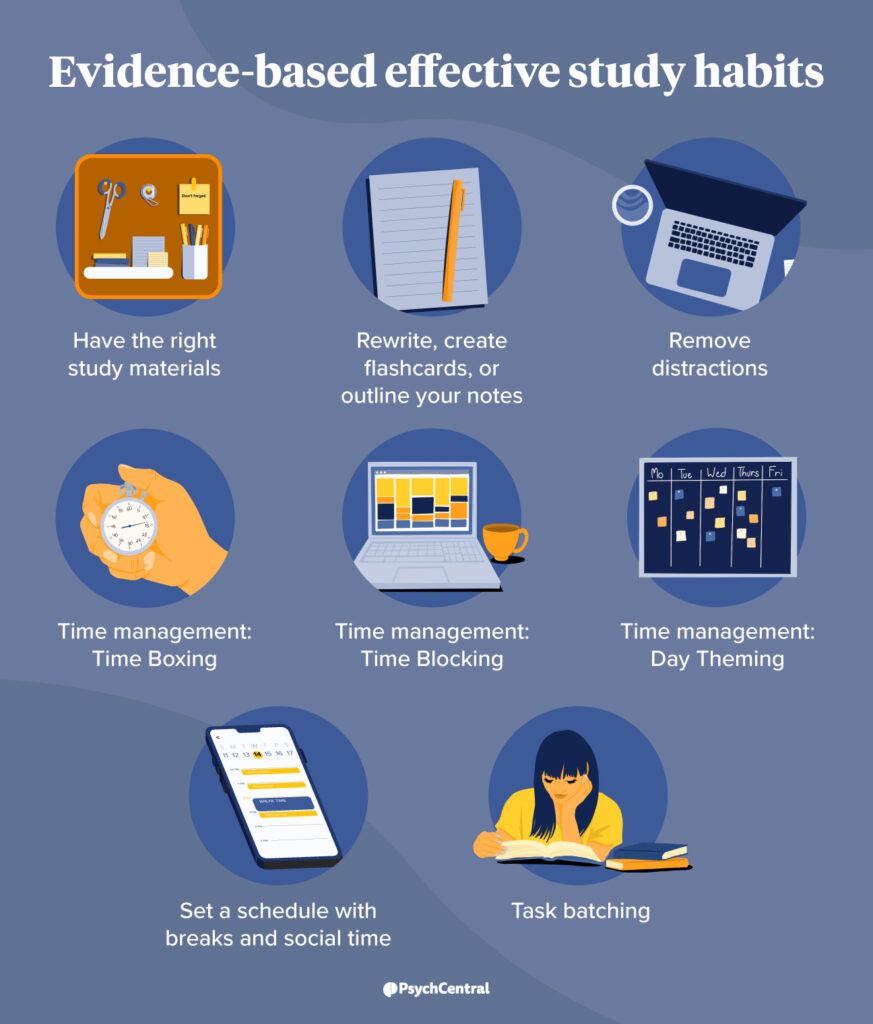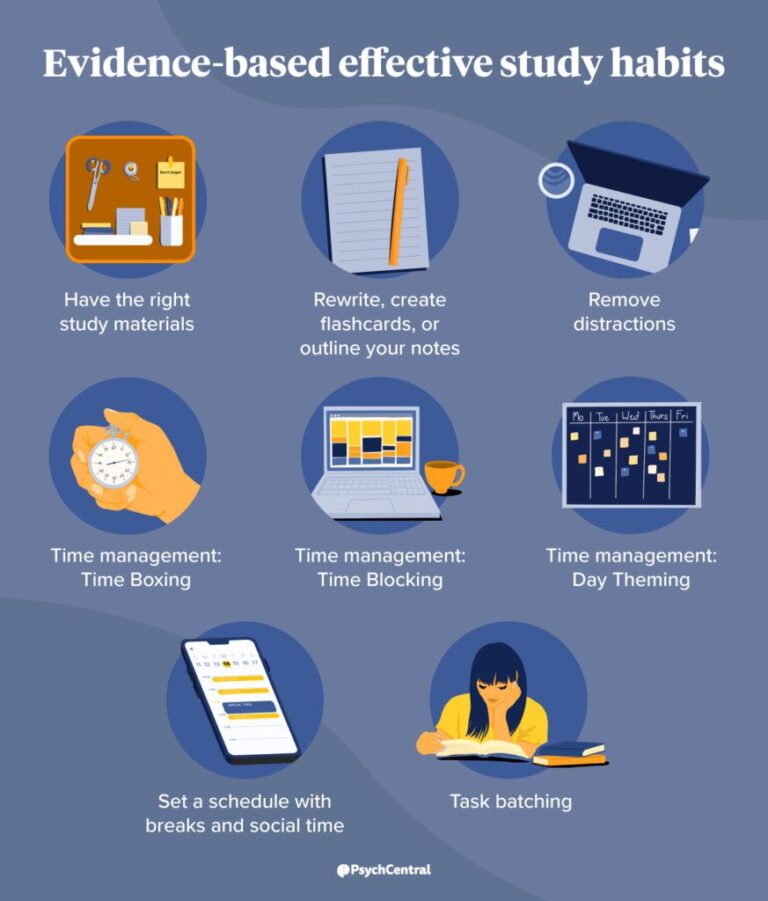How To Improve Study Habits Effectively
Two out of three students report procrastination as a primary hindrance to their academic success. It’s fascinating how altering even small habits can mitigate this widespread issue. By redefining focus and setting clear, achievable goals, students can significantly enhance their learning experience and outcomes.
Back in the 1900s, psychologist Hermann Ebbinghaus introduced the ‘Forgetting Curve’, which illustrated how information is lost over time when there is no attempt to retain it. Today, with technology and research at our fingertips, we recognize that spaced repetition and active recall are powerful strategies. Studies have shown that students using these techniques can retain up to 85% more information than those who don’t, underscoring the importance of strategic learning practices.

How to Improve Study Habits Effectively
One crucial step in improving study habits is designating a regular study time. This helps create a routine, making it easier to stick to a schedule. Consistency is key, so pick a time that works best for you every day. Over time, your brain will naturally prepare for studying at this time. This can enhance focus and retention.
Organizing your study materials is another effective strategy. Keep your notes, textbooks, and other resources in a designated spot. This reduces the time wasted searching for materials and helps you dive straight into studying. An organized environment can reduce stress and improve productivity. Use tools like folders, binders, or digital apps to keep everything sorted.
Utilizing active recall and spaced repetition techniques can significantly boost memory. Instead of passively reading, test yourself on what you’ve learned. Space out your revision over several days instead of cramming. Studies show that these methods can help retain information better. They also make studying more interactive and engaging.
It’s essential to eliminate distractions while studying. Find a quiet place where interruptions are minimal. Turn off notifications on your devices or use apps that block distractions. Create a study space that is solely dedicated to studying. This helps your mind associate the space with focus and concentration.
Step 1: Designate Regular Study Time
Choosing a specific time each day to study can make a huge difference. When you set a regular study time, it becomes part of your routine. This habit helps your brain know when it’s time to focus. Consistency makes it easier to get started. Over time, it reduces the need to motivate yourself.
Start by looking at your daily schedule. Find a time when you’re most alert and free from other responsibilities. Early mornings or late afternoons might work best for some. Make sure it’s a time when you can concentrate without interruptions. Doing this helps maximize your productivity.
If other commitments occasionally clash, try to plan ahead. Having a backup time can help you stay on track. Flexibility, without losing routine, can improve your commitment. Using tools like calendars or alarms can remind you to start studying. Keeping track can help in maintaining regularity.
Family and friends can support your study goals too. Let them know your study hours to avoid distractions. Create boundaries by politely asking for some quiet time. This mutual respect helps everyone adjust and cooperate. Over time, it creates a supportive study environment.
Step 2: Organize Study Materials
Keeping your study materials organized can save a lot of time. Instead of searching through a mess, everything will be at your fingertips. Start by gathering all your textbooks, notes, and other important items in one place. Label folders or use different colored binders for each subject. This simple step helps in swiftly locating what you need.
Think about using digital tools to stay organized. Many apps can help you store and sort notes on your phone or laptop. This can reduce clutter on your desk. You can also create a checklist to manage your tasks efficiently. Digital organization is both trendy and practical.
It’s also important to clean your study space regularly. Dust and clutter can be distracting. A clean desk can make studying more enjoyable and less stressful. Every week, take a few minutes to tidy up. This small habit keeps your mind focused on learning.
Working with your classmates to exchange notes can be beneficial as well. Sharing is a great way to ensure no details are missed. You could create a group where you share resources and study tips. This not only helps with organization but also fosters teamwork. Study sessions can be more effective when everyone pitches in.
Step 3: Utilize Active Recall and Spaced Repetition Techniques
Active recall is a study method where you actively stimulate your memory during the learning process. Instead of passively reading, you actively test yourself on the material. It improves memory retention because it requires the brain to work harder. You can create flashcards to aid in this process. This keeps the brain engaged and helps you remember more.
Spaced repetition takes the concept of active recall a step further. By spacing out learning sessions over time, you help reinforce the material in your mind. Studies suggest that this technique can significantly improve retention. Apps like Anki or Quizlet are great tools for spaced repetition practice. They remind you to review information before you forget it.
Begin by breaking the topic into smaller chunks. Study one section, then test your understanding with a quiz. After a few days, return to the same material and review it once more. This cycle helps move the information from short-term to long-term memory. It’s a powerful way to really learn something, instead of just memorizing it for a test.
Creating a study plan can help implement these techniques effectively. Set aside specific times for review, and stick to your schedule. Regular practice ensures you’re diligently applying these methods. Use a calendar or planner to keep track of your study sessions. Consistency is key in maximizing these techniques’ benefits.
These strategies don’t just aid in academic learning—they’re useful in everyday life too. Whether you’re learning a new language or picking up a hobby, active recall and spaced repetition can help. They make learning efficient and enjoyable. The idea is to make learning a rewarding and less stressful experience. With practice, these techniques become second nature.
Collaborating with peers can further enhance your success. Share your study cards and quizzes with classmates. This creates a dynamic learning environment and encourages accountability. Group learning can boost motivation and bring fresh perspectives. Together, you can achieve more effective results.
Step 4: Eliminate Distractions
Eliminating distractions is crucial for effective studying. When distractions are minimized, your focus strengthens. Start by identifying what interrupts your concentration. Is it your phone, noise from outside, or even hunger? Knowing the cause helps you tackle it better.
Phones and other devices are common distractions. Consider turning off notifications or putting your phone on silent. You can use apps that block social media or limit usage during study time. Keeping your device away while you study also helps. This ensures your attention is on your tasks.
Creating a dedicated study space can significantly reduce interruptions. Select a quiet area free from clutter and other activities. Use a table solely for studying—reserving it can improve mental focus. If noise is an issue, wearing noise-canceling headphones might help. A peaceful environment is essential for productive study sessions.
Communicate with the people around you about your study times. This way, they can help by keeping noise levels down. You can even involve them by asking for periodic check-ins to stay on track. Respectful communication ensures everyone is on the same page. Support from others boosts concentration and motivation.
Taking regular breaks aids in sustaining attention. Study for about 25 to 30 minutes and then take a short break. This break time refreshes your brain and reduces mental fatigue. Use tools like the Pomodoro Technique to manage this routine. Balanced study and break periods enhance overall productivity.
Sometimes a change of scenery can help. If your home environment is too distracting, try a library or a quiet café. These places can provide the calm atmosphere needed for deep focus. It’s beneficial to have options for where you can study effectively. Experiment and find what works best for you.
Step 5: Stay Healthy and Well-rested
Taking care of your body and mind plays a vital role in effective studying. Good health and enough rest boost concentration and memory retention. Aim for a balanced diet, packed with fruits, vegetables, and proteins. These nutrients fuel your body and brain. Avoid junk food, which can drain your energy and slow you down.
Getting enough sleep is crucial. Experts recommend 8 to 10 hours of sleep for teenagers. Sleep helps your brain process and retain information. Lack of rest leads to tiredness, making it difficult to focus on your studies. Establish a routine that allows for consistent bedtimes and wake-ups.
Exercise also enhances learning by keeping your body fit and your mind sharp. Regular physical activity increases blood flow to the brain, improving mood and concentration. Consider incorporating activities like biking, jogging, or even a brisk walk. Exercise can be a fun break from studies too. Find activities you enjoy to stay motivated.
Stay hydrated by drinking enough water throughout the day. Dehydration can make you feel tired and sluggish. Aim for about 8 glasses a day to keep your energy levels up. Carry a water bottle to class or study sessions to sip regularly. It’s an easy habit that makes a big difference.
Managing stress is also important in maintaining your health. Simple techniques like deep breathing, meditation, or even listening to music can help. These practices calm the mind and reduce anxiety. Sometimes, it’s useful to take a step back and relax when you feel overwhelmed. Taking care of your mental health is just as important as physical health.
Balance is the key to staying healthy while studying. Don’t forget to enjoy your hobbies and spend time with family and friends. A well-rounded lifestyle keeps you energized and motivated. This balance helps in achieving both academic success and personal well-being. Remember, a healthy student is a successful student.
The Role of Technology in Enhancing Study Habits
Technology has revolutionized the way students learn and study. With access to the internet, information is available at your fingertips. Online resources like educational videos and tutorials make studying interactive and fun. Platforms such as Khan Academy and Coursera offer courses on various subjects. These tools make learning accessible anytime, anywhere.
Using digital tools can help in organizing study materials efficiently. Apps like Evernote or Google Drive allow students to save and organize notes online. This means no more losing papers or searching through piles of notebooks. Digital calendars help in setting reminders for study sessions or assignment deadlines. This organization enhances productivity and keeps you on track.
Communication with peers and teachers has also improved thanks to technology. Online forums, group chats, and video conferencing make collaboration easy. Tools like Zoom or Microsoft Teams facilitate virtual study groups where students can discuss topics or solve problems together. This support system makes learning a shared experience, enriching comprehension through discussion.
Virtual reality (VR) offers immersive learning experiences that traditional methods cannot provide. Imagine exploring ancient civilizations or conducting scientific experiments in a virtual lab! VR headsets enable these possibilities by creating interactive 3D environments for students to explore. This hands-on approach makes complex concepts easier to understand.
There are also numerous apps designed specifically to enhance study habits. For example:
- Quizlet: Used for creating flashcards and practice tests.
- Anki: Uses spaced repetition techniques to boost memory retention.
- Trello: Helps manage tasks and projects visually.
These apps are great aids in making studying more effective.
The role of technology extends beyond just learning materials; it also includes mental health support. Meditation apps like Headspace provide guided sessions to help reduce stress before exams. Such resources ensure a balanced approach towards studies by supporting both academic and emotional well-being . Embracing tech tools can greatly enhance overall study habits.
The Effects of Improved Study Habits on Academic Performance
Improving study habits can lead to significant improvements in academic performance. When students organize their notes and manage their time well, they can retain information more effectively. This boosts confidence because they feel more prepared for exams and assignments. Consistent study habits also reduce stress and anxiety related to last-minute cramming. As a result, test scores often increase.
Incorporating healthy lifestyle choices like regular sleep and nutrition amplifies these effects. Rested minds process and recall information better. Students have more energy and focus, making study sessions more productive. Healthy habits, combined with effective study routines, create a strong foundation for learning. This holistic approach benefits both physical and mental health.
Good study habits also enhance lifelong learning skills. Students learn how to set achievable goals and work step-by-step to meet them. These strategies are valuable not only in school but also in future careers. The self-discipline developed through consistent study practices helps in personal growth too. Learning becomes enjoyable rather than a chore.
Group studies and peer interactions can further boost academic success. Collaborating with classmates often uncovers new insights and better understanding of complex topics. Sharing notes and discussing ideas enhance knowledge retention. This teamwork experience prepares students for cooperative work environments later in life. Together, students can tackle challenges more effectively than alone.
Experimental studies consistently show that improved study habits positively affect learning outcomes. Comparison between groups with varied study techniques highlights significant differences in their academic achievements. Students who regularly practice skills like active recall and spaced repetition score higher than those who don’t. These findings underline the importance of integrating effective study strategies. A structured approach is crucial for excelling academically.
Ultimately, refining study habits not only contributes to better grades but also builds confidence. As students see their efforts translating into success, they gain more control over their educational journey. This empowerment fuels motivation and encourages continuous learning. When students know how to study effectively, they become proactive in their education. This creates a positive cycle that echoes throughout their entire academic career.
Strategies for Maintaining Consistent Good Study Habits
Developing a routine is the first step in maintaining consistent study habits. Set aside a specific time each day to devote to your studies. This regularity helps train your brain to focus and absorb information better. Consistency can make studying feel like a natural part of your everyday schedule. Over time, sticking to a routine can greatly improve your academic performance.
Setting realistic goals is crucial in staying motivated. Break larger tasks into smaller, manageable chunks. This makes it easier to measure progress and experience a sense of achievement. Use a planner or an app to track your goals. Seeing what you’ve accomplished can encourage you to keep going.
Creating a dedicated study environment can enhance focus. Choose a quiet place with minimal distractions, like a library or a quiet room at home. Equip your study space with all necessary materials and good lighting. Having this setup ready helps you dive straight into studying without losing valuable time. A dedicated space reinforces the habit of studying in that location.
Integrating breaks into your study routine can prevent burnout. Utilize techniques like the Pomodoro Technique, where you study for 25 minutes and then take a 5-minute break. These breaks provide mental rest, helping to recharge your focus. During breaks, consider stretching, walking, or having a healthy snack. This approach keeps your energy levels consistent throughout study sessions.
Rewarding yourself after completing tasks can build positive habits. After finishing a major assignment or understanding a difficult topic, treat yourself. These rewards can be as simple as enjoying a favorite snack, watching a short video, or playing a game. Positive reinforcement encourages you to sustain your study habits. It adds a fun aspect to achieving your educational goals.
Peer support and study groups can also help maintain good habits. Collaborating with friends can motivate you to keep up with your study schedule. Sharing notes, discussing topics, and teaching each other strengthens understanding. Group studies often bring fresh perspectives and can make learning more engaging. Leveraging group dynamics can ensure accountability and sustained progress.
Final Thoughts on Enhancing Study Habits
Developing effective study habits plays a critical role in academic success and personal growth. By consistently applying techniques like setting goals, organizing materials, and minimizing distractions, students can harness their full potential. These strategies not only improve test scores but also instill lifelong learning skills. With practice, these habits become second nature, making the educational journey smoother and more enjoyable.
Technology, healthy routines, and supportive networks further enrich the learning process. Embracing these elements helps maintain motivation and focus, especially during challenging times. As students cultivate these habits, they build a foundation for achievement that extends beyond the classroom. The journey to effective study habits is a step towards a rewarding and fulfilling academic experience.

